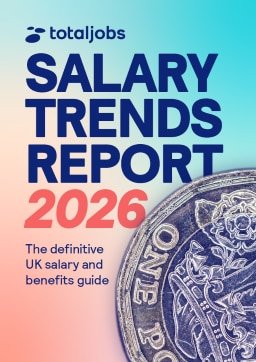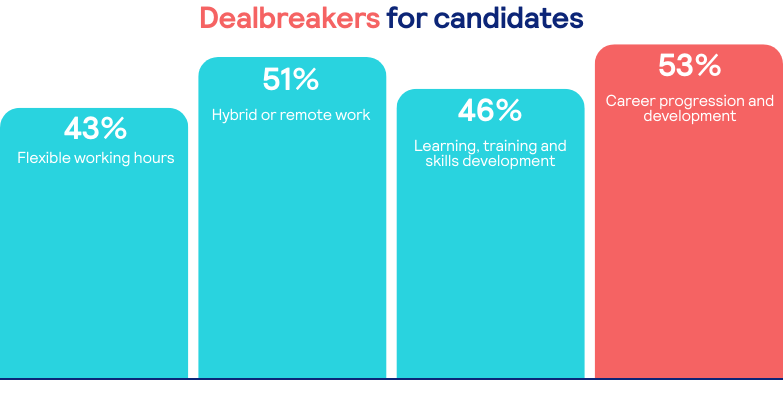
An employer’s guide to non-monetary incentives in 2026
Table of Contents
- Key takeaways
- What are non-monetary incentives?
- The benefits of non-monetary rewards
- 11 non-monetary
- Driving long-term success
- FAQs

UK Salary Trends Report 2026
While salary and benefits remain essential to talent attraction and retention, stretched budgets mean employers are becoming creative when it comes to compensation. With 41% of workers looking for or planning to look for a new role this year, non-monetary incentives are an increasing differentiator for employers aiming to stand out.
In this article, we’re looking at what non-monetary incentives are, the benefits they can provide and the top non-monetary incentives you can leverage.
Key takeaways
- Non-monetary incentives help employers manage budget constraints, offering meaningful value without the financial burden of salary increases or bonuses
- Flexibility should be prioritised, with flexible working the #1 desired benefit for UK workers and a deal-breaker for 43%
- Work-life balance should be central to compensation strategies, as it is now the top career goal for workers (38%)
- Career development is a priority for candidates, with many unwilling to apply for roles lacking progression, learning opportunities or hybrid/remote options
- Recognition and appreciation programmes deliver high impact at low cost, strengthening culture, boosting morale and improving day-to-day engagement
What are non-monetary incentives?
As the term suggests, non-monetary incentives are the strategies employers use to compensate and reward their employees that are not tied to salaries or bonuses.
These incentives can therefore include:
- Perks
- Flexibility
- Rewards
- Career advancement opportunities
Implemented effectively, these types of incentives can be a hugely effective tool for employers in their efforts to attract top talent and retain top performers, especially with our research showing that work-life balance is the top career goal for workers (38%).

Tip: Non-monetary incentives should be viewed as part of an overall compensation package, complementing competitive salary ranges and employee benefits packages, rather than replacing them.
Monetary incentives vs non-monetary incentives
In addition to salaries and non-monetary incentives, employers can offer their employees other monetary incentives. These can include:
- Stock options
- Profit sharing
While monetary incentives can help to motivate employees and drive them to accomplish specific goals, they also come with potential drawbacks:
- Diminished motivation impact: Over time, monetary rewards can become expected rather than an extra source of motivation.
- Risk of perceived inequality: Rewarding only top performers in the organisation may foster resentment among other employees.
- Increased financial burden: Monetary rewards can significantly escalate costs, possibly resulting in budget difficulties in other parts of an organisation.
By contrast, non-monetary incentives offer sustainable ways to motivate and engage employees. This is particularly valuable given 53% of workers report cutting back on leisure spending and 32% on essentials, increasing the appeal of perks that support their wellbeing and flexibility.
The benefits of non-monetary rewards
Non-monetary incentives are a powerful tool for creating an environment where team members feel genuinely valued by their employer.
By focusing on individual recognition and holistic well-being, these types of benefits can help to:
- Foster a positive workplace culture: Non-monetary incentives can help to reinforce a sense of shared purpose and belonging, thereby contributing to a culture where workers feel appreciated.
- Enhance work-life balance: Flexible working is the #1 desired benefit for UK workers and a deal-breaker for 43% of them. As a result, incentives like flexible hours and hybrid working are key to keeping employees engaged.
- Improve employee retention: With 41% of workers planning to stay in their roles this year and 76% satisfied with their current benefits package, strong benefits, both monetary and non-monetary, are central to retention strategies.
- Attract top talent: Non-monetary rewards can help appeal to candidates: 53% of workers wouldn’t apply for a role without career progression, 51% say the same for hybrid/remote work, 46% for learning and skills development and 43% for flexible working.
- Showcase organisational values: Rewards and incentives can serve as a reflection of an organisation’s core principles, demonstrating that they stand for more than just profits and outcomes.
- Boost productivity and engagement: Feeling appreciated through rewards and recognition encourages workers to take pride in what they do on a daily basis, which research shows can increase productivity by as much as 31%.
- Reduce financial burden: Compared to pay rises and bonuses, non-monetary incentives are a cost-effective approach to compensation for employers, allowing them to reward employees without overextending their own financial commitments.
Although 51% of workers looking for a new job this year are motivated by higher salaries, boosting compensation packages with desirable non-financial incentives can help employers stand out and facilitate smoother salary negotiations by providing additional value.
11 non-monetary incentives to motivate employees
There are a wide range of effective non-monetary incentives you can implement to get the most out of your workforce.
Let’s take a look at some of the most impactful.
1. Flexible work schedules
Allowing employees to adjust their working hours or adopt hybrid and/or flexible working arrangements demonstrates trust and respect for their time.
Crucially, flexible working is the most desired benefit for UK workers (41%) this year. As a result, employers that can offer this as a benefit stand to gain an advantage in their talent attraction and retention efforts.

Furthermore, by empowering staff to structure their workday around personal responsibilities, employers can help reduce stress and improve focus. This flexibility not only enhances work-life balance but also boosts productivity, as employees are better able to work during their peak hours.
In turn, this fosters loyalty by showing employees their individual needs are valued.
2. Training opportunities
Giving workers access to skill-building courses or on-the-job training shows commitment to professional growth on an employer’s part. This also equips individuals with new expertise and helps to keep organisation’s competitive by fostering innovation and adaptability.
Providing this as a benefit also meets the evolving demands of the workforce. Our research shows that 46% of workers wouldn’t apply for a role without learning and development opportunities.
Moreover, employees who see a clear pathway for development are more likely to remain engaged and committed, resulting in:
- Reduced turnover rates
- Stronger internal talent pipelines
- Better succession planning
3. Mentorship programmes
Pairing employees with experienced mentors helps to provide personalised guidance and support that is invaluable for career growth.
These kinds of mentors are there to help mentees:
- Overcome challenges
- Set and achieve goals
- Unlock their potential
4. Paid volunteer time
Allowing employees to take time off to volunteer for causes they are passionate about demonstrates a commitment to social responsibility and community impact.
This initiative aligns with the personal values of many employees, particularly younger workers, with 53% of under-35s in full-time employment expressing a desire to volunteer more than they currently do.
Offering paid volunteer time not only provides staff with the opportunity to give back, but it also deepens their emotional connection to the organisation as they see it making a tangible contribution to society.
5. Sabbaticals
Providing longer periods of leave, such as sabbaticals, offers employees the time and flexibility to recharge, pursue personal goals, or engage in meaningful long-term projects that they might otherwise struggle to prioritise.
This could include:
- Travelling
- Furthering their education
- Volunteering
- Personal development and reflection
By offering sabbaticals, employers demonstrate that they value their employees’ growth and well-being beyond their day-to-day work contributions. This thoughtful approach signals trust and recognition, fostering stronger loyalty and a deeper emotional connection between employees and the organisation.
Additionally, time away from the workplace helps reduce the risk of burnout, enabling employees to return with renewed energy, creativity, and a fresh perspective. This can result in greater innovation, enhanced problem-solving abilities, and improved productivity.
6. Praise and recognition
Recognition programmes, whether through regular shout-outs in team meetings, personalised thank-you notes, or employee awards, are cost-effective yet deliver high impact. Public recognition of achievements boosts confidence and morale, creating a ripple effect that motivates others to strive for excellence.
A genuine “thank you” from senior leaders can significantly amplify this impact. In fact, employees are 69% more likely to go the extra mile when their efforts are acknowledged. Furthermore, 37% of employees have said that more personal recognition would encourage them to produce better work more frequently.
By fostering a culture of appreciation, where contributions are noticed and celebrated, employers can build a positive atmosphere where employees feel valued, energised, and committed to contributing their best efforts.
7. Extra days off
Providing additional leave days, whether as a reward for exceptional performance or as an annual incentive, demonstrates that an organisation values employees’ contributions and recognises the importance of rest.
These extra days offer employees an opportunity to:
- Recharge after a stressful period
- Focus on their personal lives
- Return to work with renewed energy
This incentive also plays a crucial role in supporting employee wellbeing by helping to reduce the risk of burnout. When employees know they have the flexibility to take time off beyond standard leave policies, it fosters a sense of appreciation and trust.
8. Staff discount schemes
Exclusive discounts on products or services not only save employees money but also foster a sense of belonging and loyalty. These perks create a tangible connection between employees and their workplace, showing that their employer is invested in their well-being.
Tailoring discounts to employee preferences can further enhance the perceived value of this incentive. This can include partnering with:
- Local retailers
- Entertainment venues
- Restaurants

Tip: Personalisation ensures discounts align with employees’ lifestyles, making them more meaningful and impactful.
9. Birthdays off
Offering a day off on employees’ birthdays is a small but meaningful gesture that shows that an organisation values personal milestones and the need to take time off to relax and celebrate with friends and family.
By recognising these special events, employers can foster more appreciation within their workforce, which in term can help to improve well-being and engagement amongst employees.
10. Subsidised gym membership
Promoting physical well-being is a great way to effectively demonstrate an employee’s commitment to the health of their employees.
This can be achieved by offering:
- Discounted gym memberships
- Access to fitness classes
- Tailored wellness programmes
Healthier employees are more likely to be energetic, productive and focused while also taking fewer sick days. As a result, this investment not only benefits employees but also delivers a positive return for employers through improve performance and morale.
11. Opportunities for professional development
Employees who see a clear path for advancement within an organisation are more likely to feel motivated, engaged, and invested in their roles.
By providing opportunities for professional development, employers can demonstrate a commitment to supporting career progression and long-term growth. This can include:
- Providing access to industry conferences
- Hosting workshops
- Internal upskilling programmes
Offering professional development opportunities also helps retain top talent by fostering a sense of loyalty and personal growth. Additionally, it ensures that the workforce remains skilled, adaptable and equipped to meet evolving industry demands, positioning the organisation for continued success and innovation.
Driving long-term success with non-monetary incentives
Non-monetary incentives go beyond simple gestures, acting as powerful strategies for fostering lasting success. By prioritising holistic employee well-being and offering rewards that resonate with personal values, you can cultivate a culture of collaboration and mutual respect. This approach ensures employees feel invested in team achievements and motivated to contribute meaningfully to broader organisational objectives.
Frequently asked questions (FAQs)
What exactly counts as a non?monetary incentive?
Non?monetary incentives are rewards that aren’t tied to salary or bonuses. They include flexibility, recognition, development opportunities, wellbeing initiatives, additional leave, mentorship and workplace perks.
Why are non?monetary incentives becoming more important?
With 41% of workers looking or planning to look for a new role this year, employers need ways to stand out beyond pay. Non?financial incentives offer meaningful value without increasing salary budgets.
Do non?monetary incentives really influence attraction and retention?
Yes. Flexible working is the #1 desired benefit, and many candidates won’t apply for roles without progression, hybrid options or development opportunities.
Are non?monetary incentives cheaper than monetary ones?
Generally, yes. They allow employers to reward and motivate staff without the long?term financial commitments associated with pay rises or bonuses.
What are the most impactful non?monetary incentives?
Flexible working, training and development, mentorship, recognition programmes, wellbeing support, sabbaticals and extra leave consistently deliver strong engagement and retention outcomes.
How do non?monetary incentives support wellbeing?
They reduce burnout, improve work?life balance and help employees manage personal responsibilities. This is especially important as many workers are cutting back on leisure and essentials due to cost?of?living pressures.
How can employers decide which incentives to offer?
Start by surveying employees, reviewing workforce demographics, and analysing turnover drivers. Align incentives with what workers value most, for example flexibility, development and wellbeing consistently top the list.
How should employers communicate non?monetary incentives to staff?
Be clear, consistent and proactive. Highlight incentives during onboarding, in job descriptions, and in internal communications. Visibility increases uptake and perceived value.
Explore articles
Receive the latest recruitment resources and
advice to boost your hiring
By providing us with your details you agree to our privacy policy and for us to keep you updated with the latest news, events,
and special offers from Totaljobs.









